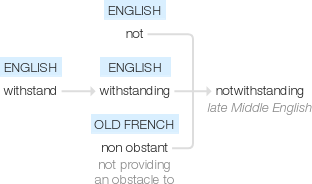Notwithstanding
late Middle English: from not + withstanding, present participle of withstand, on the pattern of Old French non obstant ‘not providing an obstacle to’.
wiktionary
From Middle English notwithstandinge, notwithstondyng, natwithstandyng, equivalent to not + withstanding. Compare Middle English notgainstonding, not aȝenstondynge, of similar meaning and formation.
etymonline
notwithstanding (prep.)
a negative present participle used as a quasi-preposition, originally and properly two words, late 14c., notwiþstondynge "in spite of, despite," from not + present participle of the verb withstand. It has the old "against" sense of with. A loan-translation of Medieval Latin non obstante "being no hindrance," literally "not standing in the way," from ablative of obstans, present participle of obstare "stand opposite to" (see obstacle). As an adverb, "nevertheless, however," and as a conjunction, "in spite of the fact that," from early 15c.
Notwithstanding ... calls attention with some emphasis to an obstacle: as, notwithstanding his youth, he made great progress. In spite of and despite, by the strength of the word spite, point primarily to active opposition: as, in spite of his utmost efforts, he was defeated; and, figuratively, to great obstacles of any kind: as, despite all hindrances, he arrived at the time appointed. [Century Dictionary]
